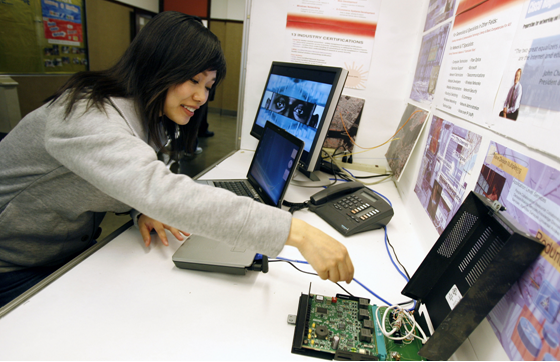Occupational outlook. Are employers hiring for jobs in this area?
Yes, definitely. Companies such as AT&T, Comcast and the Geek Squad always have a need for entry level premise technicians, installers, and computer support personnel. As the home environment contains more and more consumer electronics, systems become more complex and require expert intervention to set up and maintain them.
Technology background. Can I pursue a career in this field without a background in technology?
Yes, but you should be comfortable using a computer and typical desktop software. If you need help getting up to speed, you can enroll in CNIT 100, Introduction to Computers Using PCs.
Receptivity to hiring women. Will employers hire women into male-dominated technology areas?
Yes, in fact we have been contacted by some of the major employers specifically asking for help in attracting women into this field.
Jobs available. What kinds of jobs can I get with a certificate and with an A.S. degree?
Once you have a certificate or A.S. degree, you can be employed as an in-home technician or installer at companies like AT&T and Comcast. In fact, we are working with these companies to shorten the usual training period required for entry level employees for our graduates. Your training also qualifies you for jobs at Best Buy’s Geek Squad, which provides in-home computer support. Smaller firms who provide in-home support may also hire graduates. The more experience you get in a position, the more likely you will advance to positions with more complex requirements and responsibilities.
Salaries. What kind of salary can I expect?
A new graduate taking on a job as a premise technician or installer can expect an hourly wage of up to $18/hour. Average wage at time of placement is $35,000 - $40,000.
More information. Where can I learn more about technology careers and what they’re like for women?
Read articles about women in telecommunication careers on the Home page of our website for starters, and check out our Women in IT Associations and Women in Technology links for more information. You can also find a female mentor at E-Mentoring, join our e-mail list for women students at CCSF, network with other women at a Women in Cable and Telecommunications meeting, and read our Women’s Success Stories about other women in this and related fields.
Math skills. How much math do I really need?
There are no math prerequisites for the Digital Home Technology Integration course.
Technology skills. How can I prepare for the program if I don’t have a background in technology?
The main requirement is that you are skilled with using a personal computer and typical desktop software. If you need help getting up to speed, you can enroll in CNIT 100, Introduction to Computers Using PCs.
Placement tests.Are placement tests required for this program?
Yes, most students must take placement tests before registering for classes. Learn more at the Admissions/Registration page. Placement Tests in English or ESL (English as a Second Language) and math are given regularly during the months before registration. The placement results will help you and your CCSF counselors and faculty advisors to select the appropriate English or ESL and math courses to meet your general education requirements. The results of the testing will not be used to prevent you from attending CCSF.
Length of program. How long will it take to complete this technology program?
The Associate of Science (A.S.) Degree in Computer Networking and Information Technology (CNIT) (with an option in Digital Home Technology Integration) takes two years to complete, including general education requirements and 21 units of CNIT courses and the Home Technology Integration option courses for a total of 60 units. Visit the program information page for more information.
The certificate program usually takes one year. Many students work full-time while in school, since most classes are held in the evening. The program requires four lecture/lab courses including the new Digital Home Technology Integration course (CNIT 150) plus one lab course for a total of 13 units. Visit the DHTI certificate program FAQs page for more information.
High school preparation. Can I prepare myself for a technology program at CCSF while I’m still in high school?
Check to see if your high school has an information technology academy. Several local high schools have academies in information technology which arrange for high school students to attend classes on the CCSF campus. If not, you can still enroll in classes while you are still in high school. For example, if you want to develop skills in using a personal computer, you can enroll in CNIT 100, Introduction to Computers Using PCs.
Weight-lifting requirements. How can I prepare myself physically to meet the
weight-lifting requirements for a job as a Digital Home Integration Technician?
Since digital home integration specialists must install equipment in customers’ home environments, the ability to lift and carry up to 50 pounds is required.
Child care. Where can I get child care assistance for when I’m at school or work?
CCSF offers several onsite and offsite child care centers for low-income students through the CCSF Child Development and Family Studies Department, which offers a variety of services to students and parents. The centers serve three- to five-year old children, with a special class for toddlers at the John Adams Campus. Income eligibility is based on state guidelines. A limited number of slots are also available on a full-fee basis.
Visit the Programs page for more information about Child Development Programs. This page also links to a booklet, “Choosing Childcare, A Guide for Parents and Guardians,” to help you find and select your child care provider.
Finances. How can I get financial aid?
The Financial Aid office can help you explore your options for loans, grants, and employment programs to finance your schooling. The City College of San Francisco strives to serve all students, no matter what their financial situation.
To apply for financial aid, visit CCSF’s Financial Aid page. Counselors are available for one-to-one counseling to help you meet your individual goals. You can also enroll in Lern 64, a class directed to students on how to finance their educations.
http://www.ccsf.edu/Financial/
If you’re thinking of applying for financial aid, be sure to check the deadlines to qualify – the application process usually begins in January for that fall’s school year.
 Copyright 2010 National Institute for Women in Trades, Technology & Science | http://www.iwitts.com |


